Normally, the rule of thumb is: the fewer plugins, the better your WordPress website performs. However, there are also plugins that can make your site faster and be the solution to your loading time problem. In this article, we’ll give you an overview of the most important WordPress performance plugins.
There are numerous solutions for this: From caching plugins, minifying plugins and lazy loading plugins to all-in-one tools for more page speed. We’ll also tell you how you can measure your WordPress performance and when you actually need a performance plugin for WordPress and WooCommerce.
Server-side solutions for even more speed
Ideally, you won’t need any plugins to make your website faster. For example, if you use a lean and fast WordPress theme or if solutions like WordPress caching are already integrated on the server side, as with raidboxes. Too many plugins are more likely to slow down your system or cause conflicts with each other.
What are performance plugins for WordPress?
WordPress is a comprehensive content management system (CMS) that can be functionally expanded almost at will using plugins. Plugins are available in a wide variety of categories. Performance plugins (also: pagespeed plugins) are extensions that intervene in the processes of your WordPress website to make them better or more efficient.
For example, they optimise the cache, files, images or the database. They ensure that your website loads faster overall and performs better in terms of Core Web Vitals.
Why is WordPress performance so important?
We’re about to delve deeper into the world of WordPress performance plugins and take a detailed look at some extensions. But before that, we’ll give you a little background knowledge, starting with the question of why the performance of your website is so important in the first place. The answer is simple: because you lose visibility if your site loads too slowly.
Google loves speed and has been openly communicating loading time as a ranking factor since 2010. Since 2018, the speed of your site has also been an explicit ranking factor for mobile search queries. After all, users want to find answers to their questions as quickly as possible. Accordingly, the user experience and your conversion rate also suffer from long loading times.
In the worst case scenario, visitors will leave your website before they have even engaged with you and your business. Studies show, for example, that mobile users in particular simply stop loading the page for online shops if it takes longer than three seconds. See our guide to making WooCommerce faster.
In these cases, users are far from downloading content, taking out subscriptions, subscribing to your channels, contacting you or buying products. Slow websites therefore generate less revenue on average.
How do you measure WordPress performance?
To make your website faster with performance plugins, you first need to know how slow (or fast) it currently is. There are some helpful tools to measure this. Recommended tools include:
- PageSpeed Insights from Google
- GTmetrix
- Lighthouse (an extension for Google Chrome)
- WebPageTest
Google PageSpeed Insights and GTmetrix provide very detailed data and performance reports. However, only WebPageTest also measures perceived load time. It is probably the best and most comprehensive free tool for measuring your page load time. You can find out which settings you can make and which parameters you should pay attention to in our article WebPageTest: Analyse your website performance.
More speed
That wasn’t deep enough for you and you want to read up on PageSpeed in more detail? In our magazine, you can learn everything about PageSpeed Insights and the importance of website performance. You can also read up on how to measure your website’s loading time correctly and how to make WordPress faster in general.
Why do you need a WordPress performance plugin?
Now you know why the performance of your WordPress website is so important and which tools you can use to measure it. Perhaps your first tests have already shown that optimisation is overdue? Then let’s find out how you can tackle these issues with WordPress performance plugins.
Overall, there are an incredible number of adjustments you can make to optimise your WordPress performance. The absolute basis is fast WordPress hosting. But it also depends on this:
- keep all assets on the website as small as possible
- select the correct format for images (e.g. WebP or SVG)
- Activate caching or use server-side caching to reduce loading times and server requests
- Minimise JavaScript and CSS files as much as possible, see our minification guide
- reduce the load weight and optimise the loading sequence
- get rid of unnecessary ballast and “data rubbish
A WordPress performance plugin can help you with all of these tasks – especially if you don’t have much experience with performance optimisation and/or no programming knowledge.
Some plugins offer many functions at once, others are a little slimmer and only specialise in one or two tasks. Some you don’t need if you have good WordPress web hosting. We will go into this in more detail in the comparison.
Faster loading times for WordPress
If you want to boost your WordPress performance, it may be worth moving to Raidboxes. With our high-traffic WordPress hosting, your website will be up to four times faster, even with the highest demands. To achieve this, we have integrated caching directly on the server side, among other things. This saves you having to use some plugins.
Performance plugin vs. server-side caching
In practice, WordPress caching in particular is a major lever when it comes to the performance of your website with WordPress and WooCommerce. The website data is stored temporarily in the cache. If the website is called up again, the data is accessed directly instead of sending a new request. This makes the page load much faster.
The function can be activated via a plugin. However, depending on which hosting you use, you may be able to save yourself a plugin or two. This is because some hosters (including Raidboxes) offer server-side caching – making an additional plugin superfluous.
Which solution is best, server-side caching or a plugin, can vary greatly from person to person, depending on which setup you otherwise use for the website. That’s why you shouldn’t just blindly go for the first plugin that comes along or rely solely on your hoster. Instead, test whether you get the best results for your site with server-side caching or with a caching plugin. Our support team will be happy to help you find out how to speed up your WordPress project.
It is important that you ultimately only ever use one cache , i.e. either server or plugin. The following rule of thumb has proven itself in practice: For a normal website, you are usually best off with an optimisation plugin without (or with deactivated) cache plus server-side caching. For an online shop or a website with a member area, a performance plugin with caching and deactivated server-side caching sometimes achieves better results.
The 7 best WordPress performance plugins at a glance
So much for the theory. Next, let’s take a very concrete look at which plugins can support you. Here is our selection of the 7 best WordPress performance plugins. Most of the extensions in the list are free, but you will also find some premium plugins.
Overall, we have deliberately selected a colourful mix of plugins with different functions. Which plugin is ultimately the best for you depends entirely on your individual needs and the website project. However, this list can give you a good initial overview. Unsure about your choice? Feel free to ask our support team whether and how well the individual plugins work with our Raidboxes functions, or whether you need them at all.
Of course, the wide world of WordPress plugins also offers many other possibilities. Do you know other performance plugins that you can recommend? Then please use the comment function at the end of the article.
1. WP Rocket
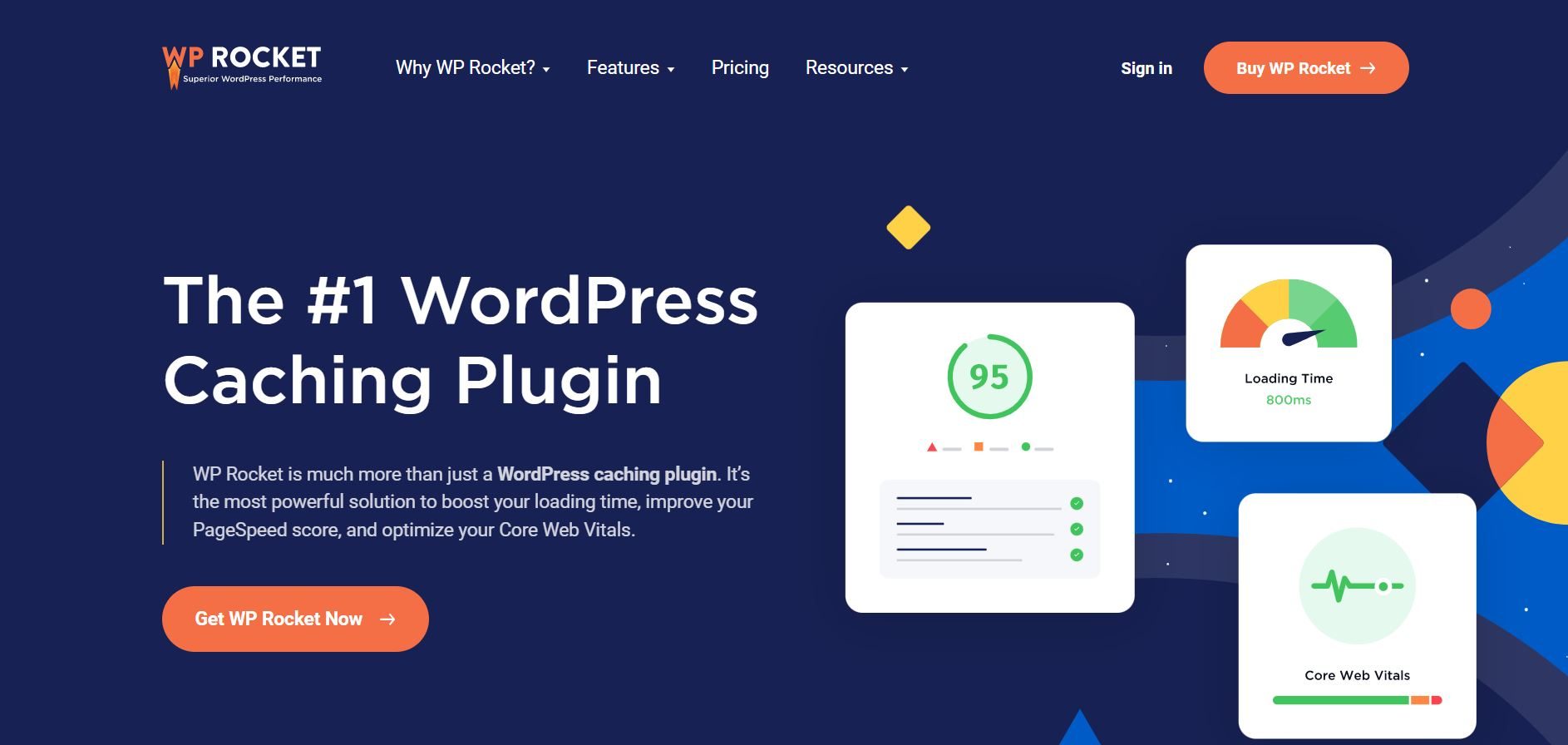
WP Rocket is a real all-rounder and one of the best, if not the best, all-in-one plugin for WordPress performance. It is particularly popular with WordPress users because it is easy to configure and works efficiently. Originally, WP Rocket was intended purely as a caching plugin, but it has since become a comprehensive extension that provides plenty of speed in various ways.
It also includes functions that would normally require a few additional plugins. WP Rocket is quick to set up and is therefore particularly suitable for anyone who is not a technical expert.
The most important functions at a glance:
- User-friendly interface
- WordPress caching including cache preloading
- JavaScript and CSS minification (including delayed loading of JavaScript)
- Lazy loading for images and videos
- Regular database cleansing
- Integration of Google Analytics for local integration
- Good support and ongoing development
Price: from €59 (for 1 website) to €299 (for unlimited websites) per year
2. perfmatters
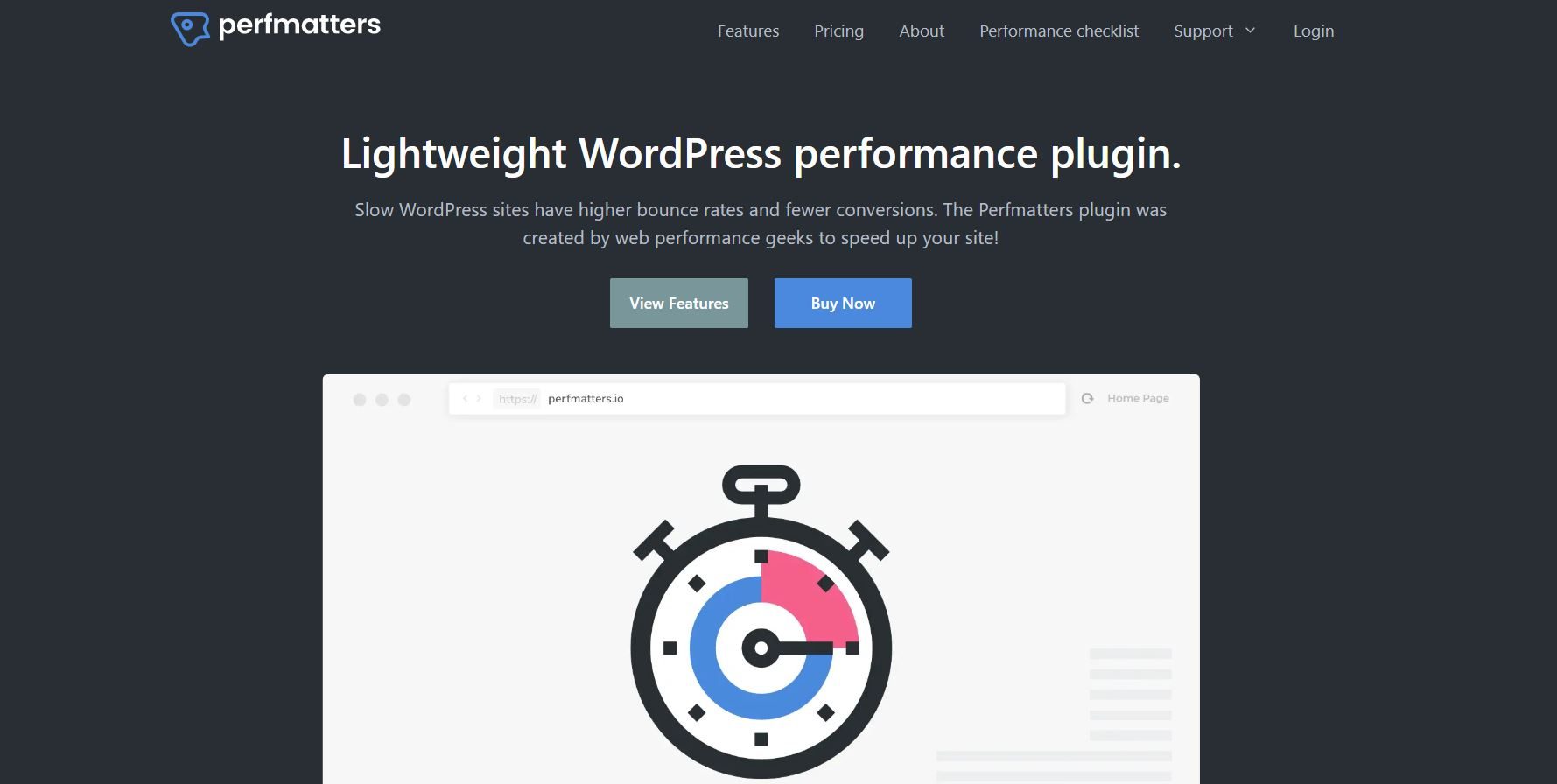
Perfmatters is also a comprehensive solution – but it completely ignores the topic of caching and instead focusses on clever WordPress tweaks. The plugin therefore takes a comparatively unusual approach. Especially if you use a hosting service such as Raidboxes, which offers server-side caching, this can be quite positive.
Perfmatters focuses on switching off unused WordPress functions that are activated by default and slow down your site. For example, emojis, embeds, RSS feeds and other basic WordPress and WooCommerce functions can be switched off with a single click.
The plugin is also equipped with a script manager that allows you to load certain scripts (e.g. from plugins) only for the pages on which they are actually used. Unused CSS can also be removed automatically and Google fonts can be integrated locally in compliance with the GDPR. The bottom line is that Perfmatters primarily helps to reduce HTTP requests on the website and relieve the database.
Despite the many functions, the plugin itself is slim and does not add unnecessary weight to your website. Overall, Perfmatters is aimed more at experienced users.
The most important functions at a glance:
- Targeted loading of scripts via Script Manager
- Google Fonts and Google Analytics can be integrated locally
- Very lightweight plugin
- Remove unused CSS
- Delayed loading of JavaScript
Price: from approx. $25 to approx. $125 per year, depending on the version
3. WP Fastest Cache and other WordPress caching plugins

WP Fastest Cache is actually a premium plugin. However, it is also available in a free version with a decent range of functions. It is particularly popular because it is quick and easy to set up and delivers solid results. As the name suggests, the focus is on caching. However, WP Fastest Cache also offers the option of minimising CSS and HTML or defining URL strings.
The most important functions at a glance:
- Simple set-up
- Delete cache with 1-click
- Minify CSS and HTML
- Set URL strings
- CDN Support
Price: free, premium version with extended functions from one-off $40
More caching plugins:
There are several other good caching plugins that offer a similar range of functions and are therefore not considered separately here. These include WP Super Cache, Cache Enabler and W3 Total Cache. All three are also free, lightweight and frequently used plugins. Which one you like best is entirely up to you.
However, you only need all of this if you are not using Raidboxes and the server-side cache. This offers you the following advantages:
- It becomes active before WordPress takes over. This makes it more performant and resource-efficient than plugin caching.
- You can define exceptions at any time using caching rules. We also support you with predefined rules, for example for the WooCommerce shopping basket.
- Expand your rules using regular expressions (regex). Ignore No-Cache or Set-Cookie header (optional).
- Change the order of the caching rules, e.g. for a staggered or logical structure.
- Empty the cache with one click. At the same time, determine the time period after which the server cache of your page is refilled.
Also specify whether there should be a shared cache for all end devices or not. Otherwise, a separate cache is used for each end device (PC/Mac, tablet, smartphone). This is important, for example, if there is a separate mobile version of your website (“m.xyz.de”).
4. WP Super Minify
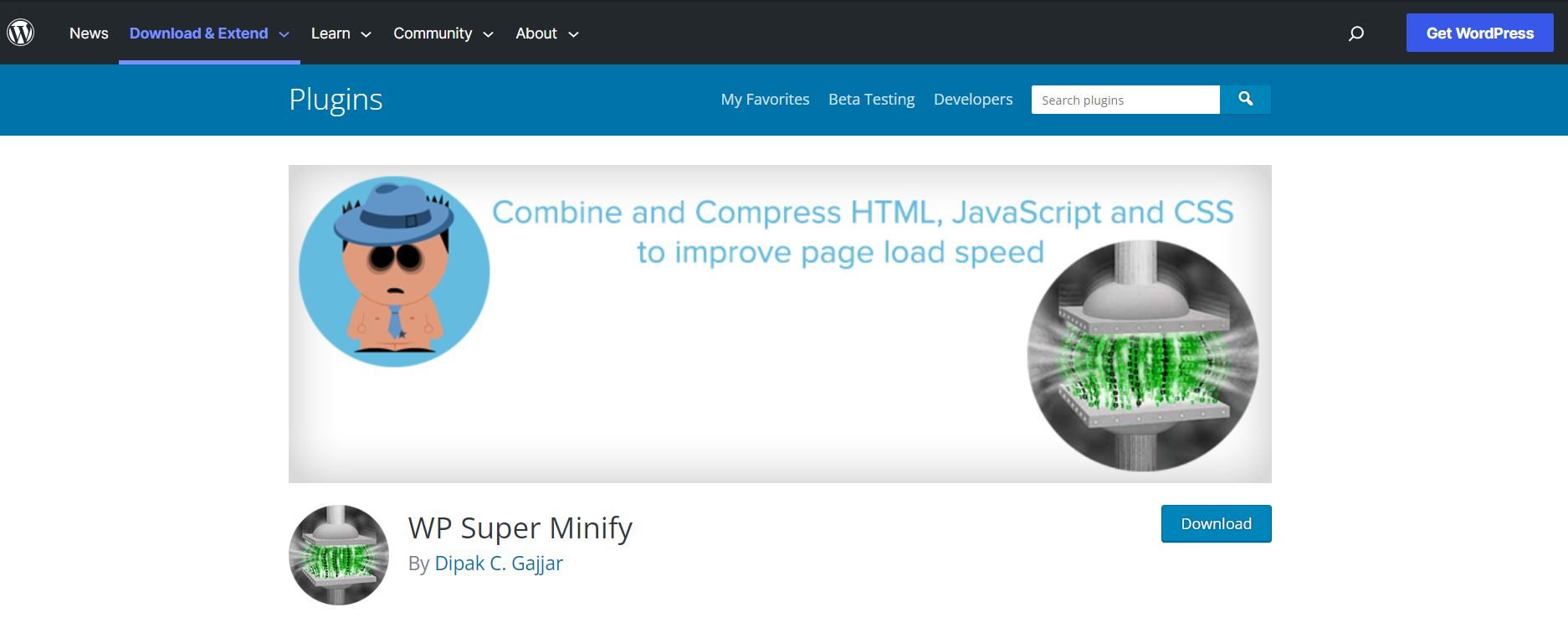
If you are already equipped in terms of caching (server-side or through another plugin), you can use WP Super Minify to specifically take care of the compression (minification) of JavaScript and CSS files. See also our article How to Minify WordPress.
These types of plugins can be a little tricky when it comes to conflicts with certain themes and other plugins. However, once they are running, they are extremely useful and can significantly reduce the loading time of your website. WP Super Minify also offers the option to switch off compression in case of conflicts.
The most important functions at a glance:
- Reliably reduces JavaScript, CSS and HTML files
- Compression of CSS and JavaScript can be deactivated
- Uncomplicated and simple application
- Open Source Software
Price: free of charge
5. smush
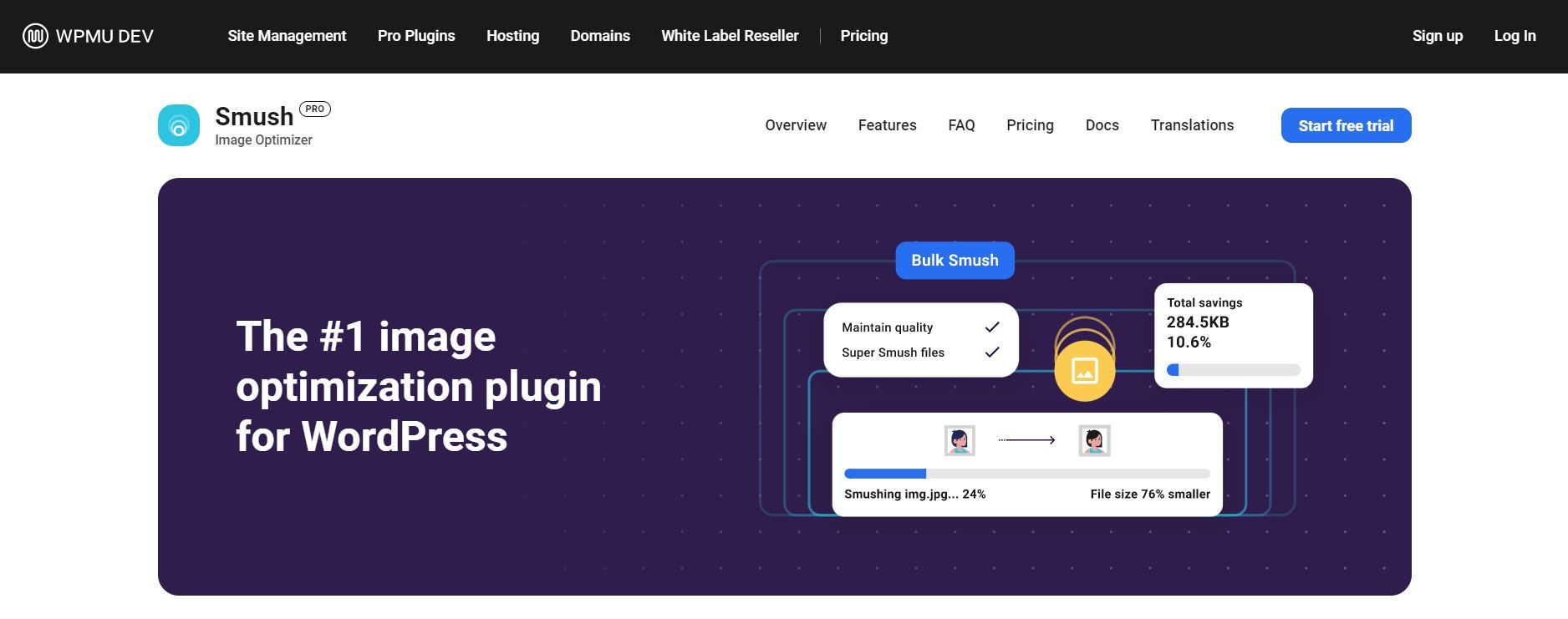
Images and graphics make up a large part of a website in terms of data. Smush ensures that images are compressed and load faster without compromising on quality. The plugin scans images for unnecessary data, formats them and identifies faulty files. Up to 50 images can be optimised at the same time.
WP Smush and WebP
Smush can convert images to the WebP format, but it saves these files in a separate folder and not in the original folder. However, this is often a requirement for the WebP format to be used automatically, even with raidboxes. A good alternative in this case is Shortpixel, which we will introduce to you in a moment.
The plugin really only specialises in image optimisation – but it does this very well. That’s why it is so popular in the WordPress community with over 1 million active installations. However, WebP images can only be created with the paid Pro version.
The most important functions at a glance:
- Lossless image compression (PNG, JPEG, GIF)
- Remove unnecessary metadata from images
- Removing EXIF files
Price: free, Pro version from $7.50 per month
6. ShortPixel Image Optimiser
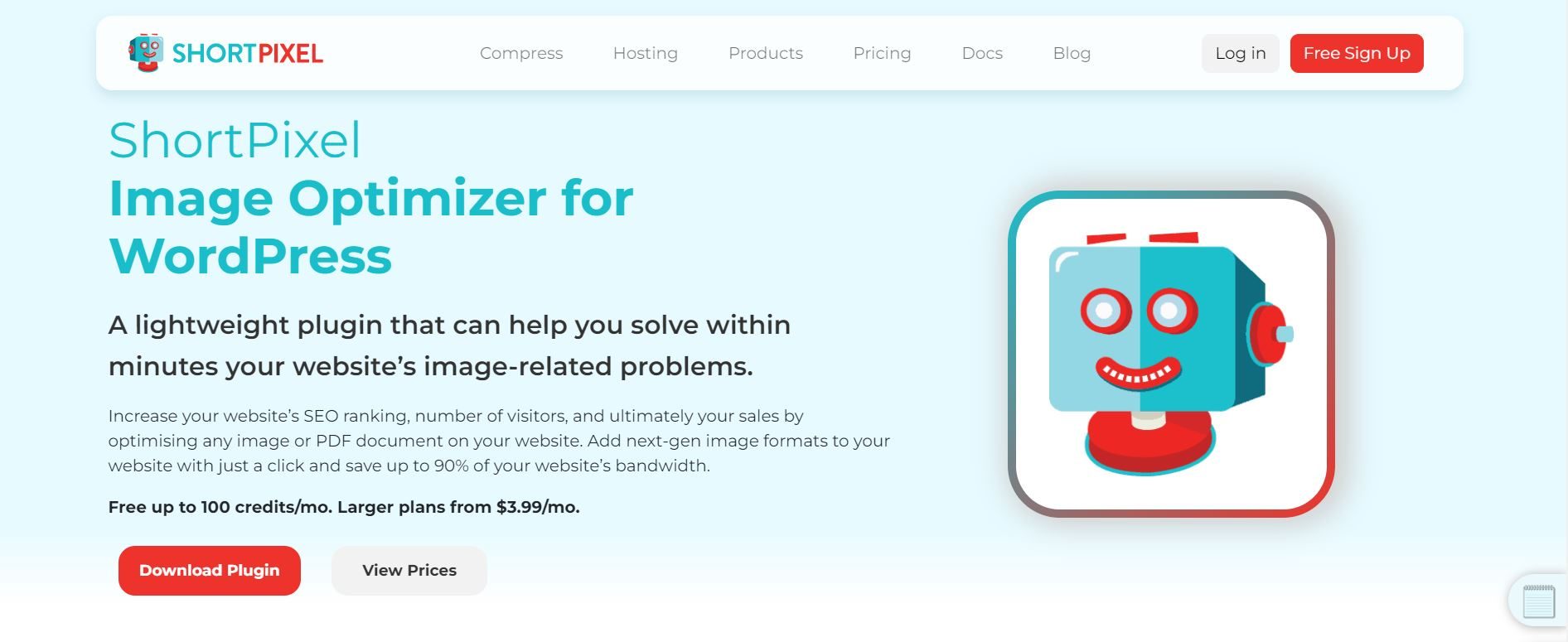
The ShortPixel Image Optimiser also improves your page speed by taking care of the images on your website. It is therefore not a performance plugin in the strict sense, but image optimisation has a strong impact on your website performance.
The plugin is intuitive and easy to use and you can easily optimise several images at the same time. The optimisation takes place directly during the upload and you can choose between compression with little or no loss of quality. The result is displayed in a preview during the process.
The ShortPixel Image Optimiser can also convert your images into modern formats such as WebP or AVIF – and, unlike Smush, this is also possible in the free version. At least for up to 100 image files per month. This makes the plugin particularly interesting for small blogs and websites. However, the paid upgrade with more images is also available at a relatively favourable price.
The most important functions at a glance:
- Good support
- Compression with little or no loss of quality
- Automatic conversion to WebP or AVIF possible
- Fair pricing
Price: free (up to 100 images per month), paid version as a subscription from $3.99 per month
7. autoptimise
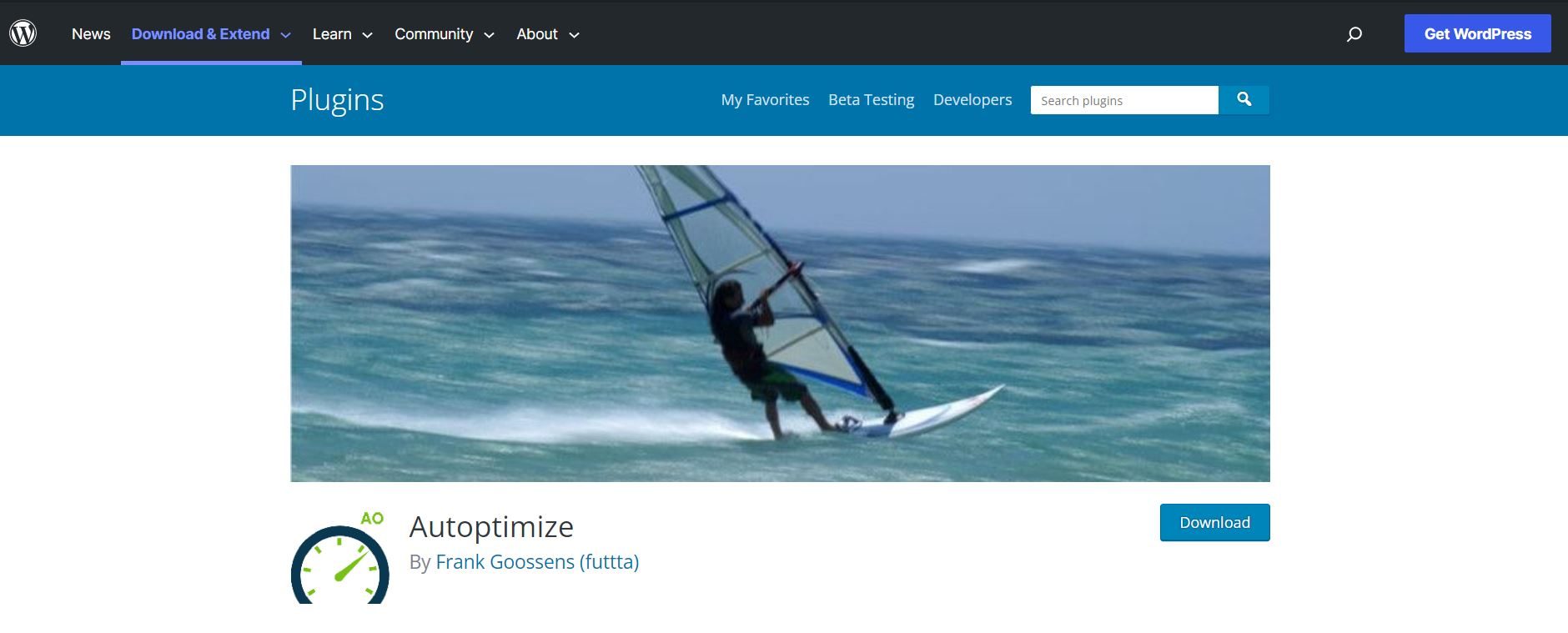
Autoptimise is one of the most popular WordPress pagespeed plugins and a real classic. It has been around for a long time and is already actively used by more than 1 million users. The plugin is not a stand-alone tool, but should rather be seen as a supplement to other plugins that take care of caching (e.g. WP Rocket).
With Autoptimize, you can compress load time hogs such as JavaScript and CSS files with a simple mouse click. Autoptimize moves scripts to the footer, for example, and delays the loading of files such as HTML, CSS and JavaScript or even Google fonts. Experienced users can also make many customised settings.
The most important functions at a glance:
- Minimising HTML, CSS and JavaScript files
- Optimisation of images (subject to charge)
- Compatible with a wide range of caching plugins
Price: free, Pro version (with image optimisation) from $5 per month
Frequently asked questions about WordPress performance plugins
How do I make my WordPress website faster?
The basis for a fast WordPress website is suitable WordPress hosting. In addition, caching is probably the most important performance factor. It can either be activated on the server side via the hoster or using a plugin. Images should also be kept as small as possible and functions that are not required should be deactivated. You can find out more about this topic in our e-book Making WordPress faster.
Are performance plugins for WordPress free of charge?
Not all performance plugins for WordPress are free. There are both free and paid WordPress performance plugins. Comprehensive all-in-one plugins in particular are usually only available for a fee. However, there are also good free versions of many premium plugins with somewhat slimmed-down functions. These are often sufficient for small websites in particular.
What are the best WordPress performance plugins?
The best WordPress performance plugins include WP Rocket, Autoptimise and pure caching plugins such as WP Super Cache, Cache Enabler and WP Fastest Cache. However, which plugin is actually the best depends on your individual requirements.


Leave a Reply